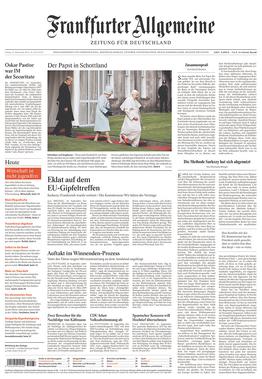
The Frankfurter Allgemeine Zeitung is a German newspaper founded in 1949. It is published on daily basis in Frankfurt. Its Sunday edition is the Frankfurter Allgemeine Sonntagszeitung.
The Goethe Prize of the City of Frankfurt is an award for achievement "worthy of honour in memory of Johann Wolfgang von Goethe" made by the city of Frankfurt am Main, Germany. It was usually an annual award until 1955, and thereafter has been triennial. Following a decision of municipal authorities in 1952, the "Award of the Goethe Prize" only takes place every three years. Many recipients are authors, but persons working in several other creative and scientific fields have been honoured. The prize money is €50,000.
Félix José Weil was a German-Argentine Marxist and patron, who provided the funds to found the Institute for Social Research in Frankfurt am Main, Germany, the institute later originated the Frankfurt School.
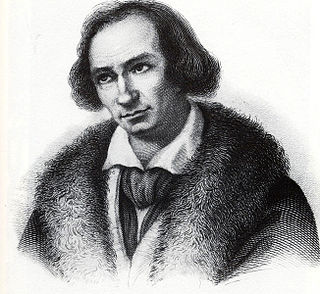
Georg Friedrich Daumer was a German poet and philosopher.
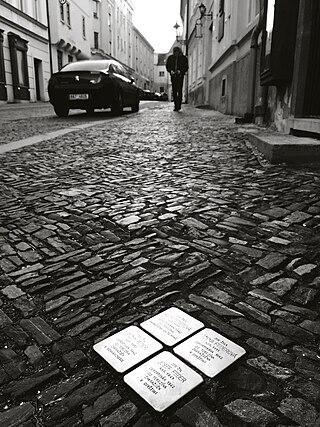
A Stolperstein is a ten-centimetre (3.9 in) concrete cube bearing a brass plate inscribed with the name and life dates of victims of Nazi extermination or persecution. Literally, it means 'stumbling stone' and metaphorically 'stumbling block'.
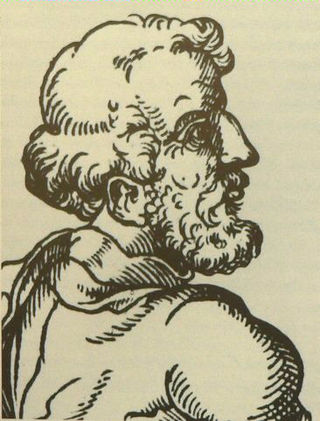
Jacob Micyllus, was a German Renaissance humanist and teacher, who conducted the city's Latin school in Frankfurt and held a chair at the University of Heidelberg, during times of great cultural stress in Germany.

Sächsisches Landesgymnasium Sankt Afra zu Meißen is a boarding school for highly gifted students in the German city of Meissen, Saxony. Founded in 1543 as Fürstliche Landesschule and re-established in 2001, the stated aim of the school is to promote the intellectual and social development of highly gifted students. The costs for attending the school comply with the maxim of social balance; the boarding and schooling fees are considerably low in contrast to similar institutions. It is the first publicly funded school for highly gifted students in Germany and is a role model for similar schools.

The Heinrich-von-Gagern-Gymnasium is a Gymnasium with a focus on the classical humanities and modern languages in the Ostend city district of Frankfurt am Main, Germany.

Eberhard-Ludwigs-Gymnasium is a gymnasium in Stuttgart established in 1686. The gymnasium is the oldest in the city, from which many of the others emerged over the years. It is often referred to as ‘Ebelu’, made up of the first few letters of the namesakes names.

The Hochschule für bildende Künste Hamburg is the University of Fine Artsof Hamburg. It dates to 1767, when it was called the Hamburger Gewerbeschule; later it became known as Landeskunstschule Hamburg. The main building, located in the Uhlenhorst quarter of Hamburg-Nord borough, was designed by architect Fritz Schumacher, and built between 1911 and 1913. In 1970, it was accredited as an artistic-scientific university.

The Collegium Fridericianum was a prestigious gymnasium in Königsberg, Prussia. Alumni were known as Friderizianer.

The Musterschule is a gymnasium in Frankfurt, Germany. It was founded on 18 April 1803 by Wilhelm Friedrich Hufnagel as a Realschule and is Frankfurt's second oldest higher school after the Lessing Gymnasium. It received the name Musterschule due to being an experimental and progressive school based on Johann Heinrich Pestalozzi's educational ideas. In accordance with this tradition, the school has been named a "center for music education and gifted education" by the Hessian ministry of culture. Since the 19th century, it has been renowned throughout Germany and abroad as a progressive Realgymnasium. The Musterschule is a neighbour of the Philanthropin, the renowned Jewish school founded by Mayer Amschel Rothschild, which is found on the other side of Eckenheimer Landstraße.
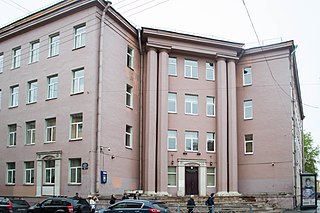
St Petersburg Classical Gymnasium is a coeducational public school established in 1989 in Saint Petersburg, Russia. It is one of the schools created in St Petersburg after the collapse of the Soviet Union. Formally gymnasium consists of two institutions: secondary school and high school. Up until 2011 there were two classes enrolled every year, but since then three classes are formed in the 5th grade. The mission of the school is to teach students how to learn, to develop independent analytical thinking and strengthen their interest in acquiring new knowledge. The school lays an emphasis on ancient languages and maths.
Gerhard Storz was the son of a Lutheran pastor from Württemberg who at various stages distinguished himself in theatre productions, as a scholar, an educationalist, a politician and an author-journalist, sometimes pursuing one career at a time and sometimes several in combination. Throughout his adult life he liked to see himself as a "language therapist". "Human speech seems to have been encoded, sealed into formulaic structures, and pressed into service for mechanistic operations", he once wrote.

Claus Friedrich Wisser was a German businessman and philanthropist, a patron of music and the arts. He was head of the service company Wisag which he founded, and was chairman of its supervisory board since 2011, and honorary chairman of that board from 2022.
Johann Georg Reißmüller was a German journalist, a co-publisher of the Frankfurter Allgemeine Zeitung(FAZ). He was a correspondent in Belgrade, then the capital of Yugoslavia, from 1967 to 1971. When the country broke up, he was instrumental in Germany recognizing Croatia and Slovenia.
Goethe Plaque of the City of Frankfurt is an award conferred by Frankfurt, Hesse, Germany and named after Johann Wolfgang von Goethe. The plaque was originally designed by sculptor Harold Winter. The plaque is awarded at irregular intervals to important poets, writers, artists, scientists and other personalities of the cultural life.

Manuela Rottmann is a German lawyer and politician of the Alliance 90/The Greens who has been a member of the Bundestag from the state of Bavaria since 2017.
The Musisches Gymnasium Frankfurt was an educational institution leading to a university entrance qualification within the framework of the National Socialist Education System. It was founded in 1939 as the first Musisches Gymnasium of the then Greater German Reich at Adolf Hitler's request and closed after the end of the Second World War in 1945. The school was under the direct supervision of the Reich Ministry of Science, Education and Culture, and the city of Frankfurt was the school authority. It became known under its director Kurt Thomas. In its internal constitution, the Musisches Gymnasium retained a special position within the National Socialist elite schools, for example through the performance of otherwise suppressed church musical works or the inclusion of confessional religious instruction in the timetable.
Karl Reinhardt was a German head teacher who became a pioneering school reformer.















